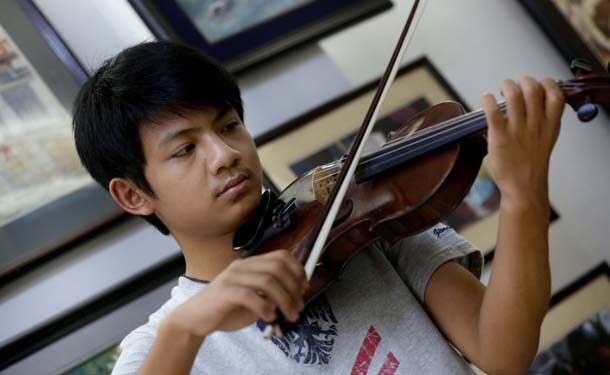RANGOON — Burmese-born violinist San Win Htike has just completed his third year at the Yong Siew Toh Conservatory of Music in Singapore. During a visit to his homeland in May this year, he gave a short recital of his adventures in music across China, Thailand and Singapore. In his performance, at the Legacy Music Academy in Rangoon, he showed off his skills, and his own ideas about music.
San Win Htike a.k.a Phong Phong started studying violin at the age of 5 in Ruili, on the Chinese side of the Yunnan-Shan State border. Aged 14, he enrolled in a young artists program at Yong Siew Toh. He has participated in festivals such as SAYOWE in Thailand and the Hong Kong New Music Festival in Hong Kong. He sometimes returns to Burma during the school holidays to raise people’s interest in music through teaching and giving recitals in the Rangoon and Mandalay. During his recent visit, he sat down with The Irrawaddy to discuss his music, his inspiration and his instrument.
Question: What made you begin playing the violin?
Answer: I played it by accident. My mother found an advertisement that a teacher in Ruili would open a violin course. My mother went there and made enquiries. When I got home, I found a violin waiting for me! I had no idea about this tool, but I tried it. At first, I was still so young and I didn’t know what I was doing. The tips of my fingers felt pain. But I found it fresh and new in the beginning. I was interested in it. With time, I felt unhappy doing it sometimes. But when I played some songs, I found it so interesting again.
Q: After you had succeeded in playing some difficult notes on the violin, did you feel you could apply the same kind of hard work to other problems?
A: Most of my friends would tell me: “It’s impossible to play these songs at your level.” But, for me, I had been practicing the songs without ever thinking of impossibilities. I simply practiced it. In my mind, if I try, I’ll get it. If I repeat something again and again, I know I will master it. I never say to myself it is impossible to get something. If you say to yourself it is impossible, you will not get it.
Q: What is the most difficult part of playing the violin?
A: In my opinion, it’s not that difficult to play the instrument. If you practice enough, you can play it. But the difficult part is: Why are you playing? You need to consider it, even though nobody asks you like that. If you play without thinking about what you are playing, it will look like a robot.
Q: At the moment, who is the most influential violinist for you?
A: In recent years, Bela Bartok is the one who influences me. He combined classical music theories and the themes from Hungarian folk songs and created his own music. I like his idea of creating something new, not deleting what’s different.
Q: What is your relationship with your instrument?
A: I’d say we are partners. Sometimes, when I practice, when I cannot get something, I talk to the violin: “Why can’t I get this?” “Why are you doing this to me?” Afterward, I’m sorry and I keep on practicing. After I get it, I feel sorry for blaming the violin. He’s there to create songs for me. And the violin is more than just a tool, I think. It’s more like my voice. I can’t sing, but with the violin I can make something musical.
Q: In Burma, we have our own well-known violinists like U Tin Yi. How did you feel when you met him?
A: When I met with him about 10 years ago, he could still play and it was really fun playing with him. Everyday I’d go to his house and we’d play something together. And he started teaching me Burmese traditional folk songs and it was really enjoyable. But now…he’s still healthy, but he’s getting old. He cannot play as much as before. He’s really a good player. I enjoyed playing with him, 10 years ago.
Q: Do you have any intention to present Burmese traditional songs to a Western audience?
A: Yeah, someday when I’m really confident. I’m still learning.
Q: What’s the best part about being a musician?
A: The best part is we don’t have to wake up at 9 in the morning to go to work.
Q: What is the hardest part about being a musician?
A: Ha. We have no proper job.
















